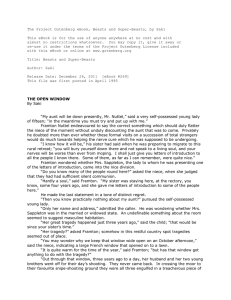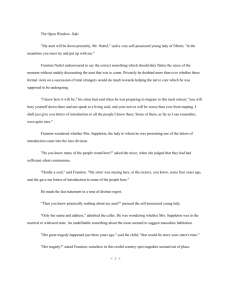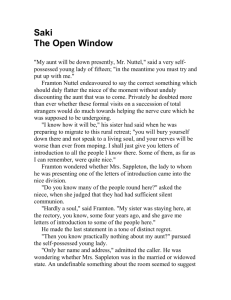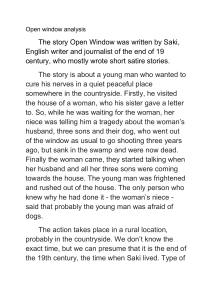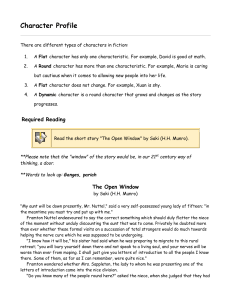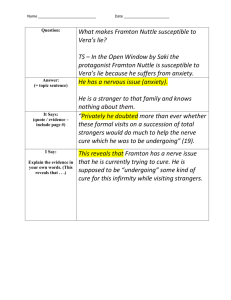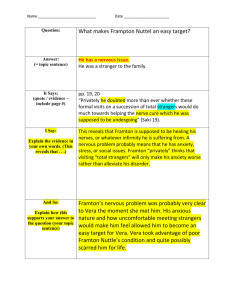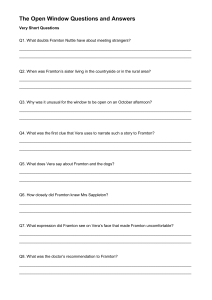The Open Window by Saki: A Short Story Analysis
advertisement
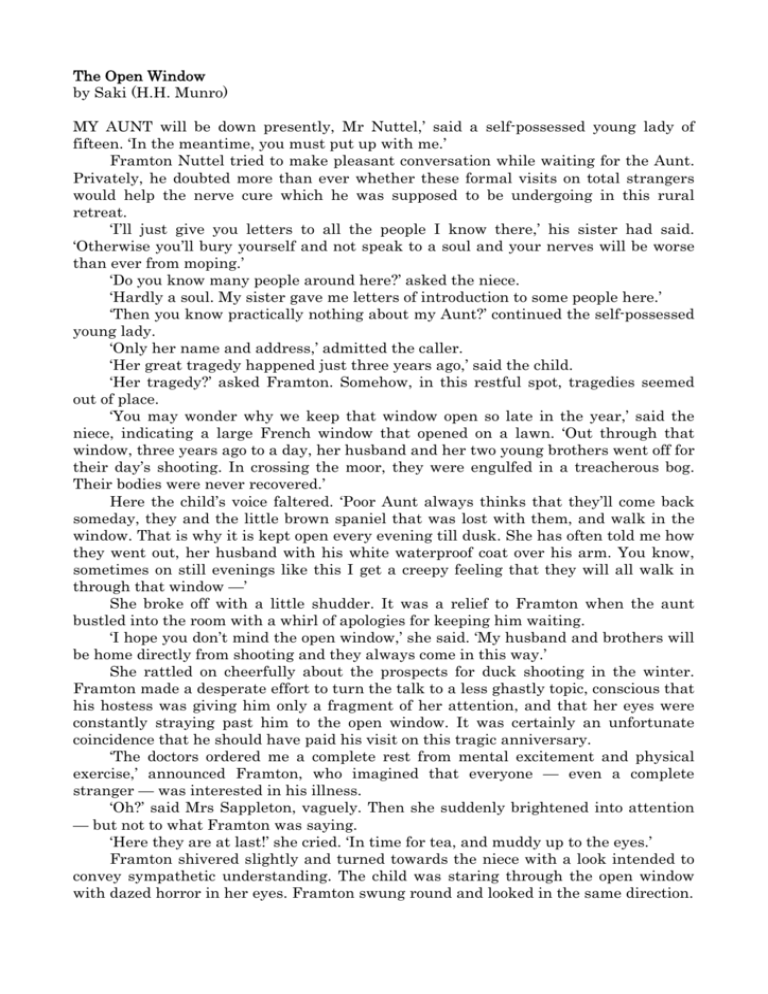
The Open Window by Saki (H.H. Munro) MY AUNT will be down presently, Mr Nuttel,’ said a self-possessed young lady of fifteen. ‘In the meantime, you must put up with me.’ Framton Nuttel tried to make pleasant conversation while waiting for the Aunt. Privately, he doubted more than ever whether these formal visits on total strangers would help the nerve cure which he was supposed to be undergoing in this rural retreat. ‘I’ll just give you letters to all the people I know there,’ his sister had said. ‘Otherwise you’ll bury yourself and not speak to a soul and your nerves will be worse than ever from moping.’ ‘Do you know many people around here?’ asked the niece. ‘Hardly a soul. My sister gave me letters of introduction to some people here.’ ‘Then you know practically nothing about my Aunt?’ continued the self-possessed young lady. ‘Only her name and address,’ admitted the caller. ‘Her great tragedy happened just three years ago,’ said the child. ‘Her tragedy?’ asked Framton. Somehow, in this restful spot, tragedies seemed out of place. ‘You may wonder why we keep that window open so late in the year,’ said the niece, indicating a large French window that opened on a lawn. ‘Out through that window, three years ago to a day, her husband and her two young brothers went off for their day’s shooting. In crossing the moor, they were engulfed in a treacherous bog. Their bodies were never recovered.’ Here the child’s voice faltered. ‘Poor Aunt always thinks that they’ll come back someday, they and the little brown spaniel that was lost with them, and walk in the window. That is why it is kept open every evening till dusk. She has often told me how they went out, her husband with his white waterproof coat over his arm. You know, sometimes on still evenings like this I get a creepy feeling that they will all walk in through that window —’ She broke off with a little shudder. It was a relief to Framton when the aunt bustled into the room with a whirl of apologies for keeping him waiting. ‘I hope you don’t mind the open window,’ she said. ‘My husband and brothers will be home directly from shooting and they always come in this way.’ She rattled on cheerfully about the prospects for duck shooting in the winter. Framton made a desperate effort to turn the talk to a less ghastly topic, conscious that his hostess was giving him only a fragment of her attention, and that her eyes were constantly straying past him to the open window. It was certainly an unfortunate coincidence that he should have paid his visit on this tragic anniversary. ‘The doctors ordered me a complete rest from mental excitement and physical exercise,’ announced Framton, who imagined that everyone — even a complete stranger — was interested in his illness. ‘Oh?’ said Mrs Sappleton, vaguely. Then she suddenly brightened into attention — but not to what Framton was saying. ‘Here they are at last!’ she cried. ‘In time for tea, and muddy up to the eyes.’ Framton shivered slightly and turned towards the niece with a look intended to convey sympathetic understanding. The child was staring through the open window with dazed horror in her eyes. Framton swung round and looked in the same direction. In the deepening twilight three figures were walking noiselessly across the lawn, a tired brown spaniel close at their heels. They all carried guns, and one had a white coat over his shoulders. Framton grabbed his stick; the hall door and the gravel drive were dimly noted stages in his headlong retreat. ‘Here we are, my dear,’ said the bearer of the white mackintosh. ‘Who was that who bolted out as we came up?’ ‘An extraordinary man, a Mr Nuttel,’ said Mrs Sappleton, ‘who could only talk about his illness, and dashed off without a word of apology when you arrived. One would think he had seen a ghost.’ ‘I expect it was the spaniel,’ said the niece calmly. He told me he had a horror of dogs. He was once hunted into a cemetery on the banks of the Ganges by a pack of stray dogs and had to spend the night in a newly-dug grave with the creatures snarling and foaming above him. Enough to make anyone lose his nerve.’ (from the book ‘The Short Stories of Saki’ © 1930, The Viking Press) Questions 1. What is the problem with Framton Nuttel? 2. What is it about Mrs Sappleton’s niece that causes Framton additional distress? 3. Describe in your own words what happens from the time Framton comes into the Sappleton household, with particular attention to why things happen as they do. 4. What is the climax (or high point) of the story, and at what point do we understand what the niece is really like?

